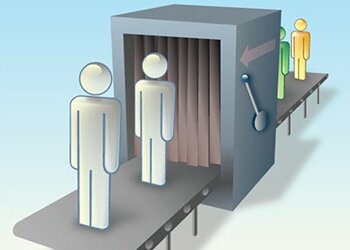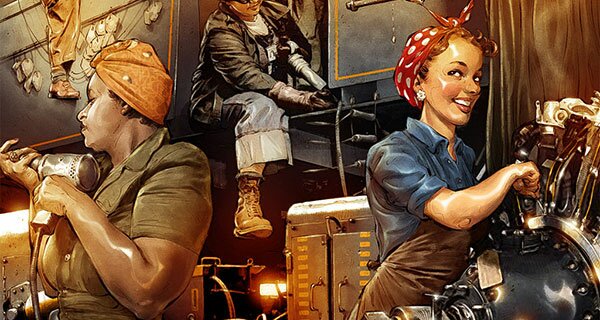What makes us put up with violence? Why, when we see abuse around us do we pretend it's not abuse. This is a question that as a sociologist and parent of two school age children I find myself asking a lot. Why don't we see the violence that our kids are subjected to on a daily basis? Why do we normalize, minimize, and ignore abuse? What's even more of a concern, why can we see it for what it is in some situations, but be totally oblivious in another. Inquiring minds, research scientists, and concerned parents want to know.

I just put my kids on the school bus.
I had to talk to to the bus driver this morning about some of the other kids. Turns out my kids are being picked on by others on the bus. One person says “raise your hands if you think ‘so and so’ is stupid” and everybody raises their hands. One other child calls my daughter a “vagina picker” and one kid likes to trip people as they go by.
So, I talk to the bus driver, relate the story, and he looks at me and says, it’s really not that bad.
*Cough, cough, * I sputter, not sure what I heard I say “what?”
He repeats.
“It’s not that bad.”
So I correct him.
“No, it is bad.”
“It’s emotional abuse.”
“It’s name calling.”
“I’ll pull my kids off your bus.”
“I’ll keep them home.”
“Oh OK, I’ll talk to them,” he says.
Frustration.
Anger.
Shock.
What is it about our bleeping culture that makes it OK for children to be exposed to abuse?
I mean really, it’s not a huge moral or intellectual leap to see that its wrong.
Can you imagine if I walked into that bus, looked at the kids and said “raise your hands if you think your bus driver is an idiot!”
Shock.
Open mouths.
Dr. Mike lying on the ground, punched out by irate bus driver who I’ve just insulted.
Its shocking to think I would do that to another adult, but it is everyday “normal” when kids do it to each other.
As a sociologist I have to ask, why is that? Why we do let our kids beat up on each other like that when we wouldn’t tolerate for an instant the same behavior from an adult.
Well, for one reason, we excuse.
We justify it.
We think its OK.
“Kids are kids?” right?
“Boys will be boys,” correct?
Roll out the same old excuses and then walk walk away with self satisfaction, but those are just excuses.
Here’s a thought experiment for you.
Go to work, find the geekiest co-worker, stand him up in front of everyone and then ask everyone around you to raise their hands if you think he’s stupid.
I don’t have to spell it out.
It is easy to see.
If I did that I would be bullying my coworker.
If I did that I would be engaged in some pretty nasty emotional abuse.
Its is inconceivable that we could do that at work, in a restaurant, on the street, and even more so to think we’d get away with it.
But if a kid does that, no big deal.
Why?
Because we don’t see it as emotional abuse when a kid does it.
When I talked to the bus driver today, he didn’t think my kids were being abused.
“It’s not that bad,” he says.
And he’s not the only one who would minimize that situation so…
Why?
Why don’t we see it when our kids are being abused?
We do we justify?
We do we excuse?
Why do we minimize?
Now that’s a good question and one worthy of some serious sociological attention.
Why do we allow our children to do that to each other?
Well, I think there may be a couple of reasons for that.
For one, maybe we’re doing it to our kids and therefore don’t want to see it as abusive. I work with abused people and a large part of their stories involve physical, emotional, and psychological abuse perpetrated by their parents.
Screaming, yelling, slaps, name calling.
Putting the child down.
Making it feel bad.
Going to work with a pleasant smile.
Coming home, doing it again.
Perhaps if we called a rose a rose on the bus, and in the school, and in the church, and on the street, the carefully constructed facade of how we’re all such good parents would begin to crumble.
Perhaps if we saw the Truth on the bus, we’d see the Truth in our homes.
And maybe we’re not ready to look at the Truth.
And maybe we’re too uncomfortable to think it.
For two, when you think about it, covering up reality is what we’ve been trained to do.
Take a look at your childhood.
How many of you had parents that hit you, or called you names, or made you feel stupid, beat you, put you in a corner, shoved you in the basement, or yelled at you all the time.
And how many of you minimize the abuse you experienced?
Don’t you remember how bad it made you feel when you were a child?
Don’t you remember the tears, the anguish, the desperate longing for love, and the self loathing that you experienced?
Of course you don’t.
Male or female, you were told to stuff it in, pretend it wasn’t bad, and (when people came over) pretend you lived in a happy family.
And that’s what you did.
“Quit being such a baby.”
“Quit feeling so bad.”
“Go to your room until you smarten up.”
Get out of my face until you stop feeling the pain.
GROW UP for God’s sake! (wow, now if that isn’t using using God’s name in vain, I don’t know what is).
“Smile and be real good or else because we’ve got company coming.”
Ah!
That’s it.
Grownups don’t feel
Grownups don’t hurt.
Grownups pretend!!
And besides, you don’t want to remember because to do so it would make you feel like that hurt child once again, and you don’t want to feel like that hurt child.It’s just to ugly a felling and you don’t want to have anything to do with those ugly feelings you once had because if if you admitted the abuse on the bus…
If you saw it for what it was…
Then you’d have to admit that maybe your childhood wasn’t as good as you thought.
Then you’d have to take a hard look at the parents who engaged in the actions.
Then you’d have to admit you’d been the victim of abuse.
Then you’d have to remember and if you did then who knows where that might lead.
You whole world might come crumbling down.
And goodness, you don’t want that, do you?
So instead of confronting reality let’s selfishly pretend that child abuse is OK, OK?
Let’s call it spanking, and not assault.
Let’s call it discipline, and not verbal abuse.
Let’s say “it’s not so bad after all,” and go on with our lives and sacrifice yet another generation to the world and the wheel.
Or not.
I guess we could pout a stop to it in our lives, and the lives of others right now.
But that will take courage, fortitude, and the strength to look at the lives we live and say, “hey, that’s wrong.”
We all a choice. It’s up to you I guess what happens next I guess.
 The Socjourn A New Media Journal of Sociology and Society
The Socjourn A New Media Journal of Sociology and Society



I don’t see why the bus driver should have anything to do with the matter. His job is to make sure your children arrive home safe so you don’t have to. He reports any intolerable behavior to the principal of the school in which your children attend. From my understanding, he is a privately contracted individual who is responsible for the safe transportation of the students, and to say his actions were wrong when he was remaining neutral on the subject. As a concerned parent, you should be contacting the principal or head of the school board who have specialized degrees in such matters. Instead of berating bus drivers who are trying to do their jobs and writing misguided articles perhaps your time would be better spent in eliminating the insecurities of your own children. Although the point you are getting across is valuable, I believe you utilized the wrong example to express it.
Well, please define “safe” for me. What does it mean that the bus driver is responsible for ensuring my children arrive safely? Does this mean just physically safe or can I also expect their psychological and emotional well being to be “safe” as well.
He hardly remained neutral on the subject. He told me it “wasn’t that bad.” He is making a moral, professional, and value judgment on the condition of his bus and the state of the children’s behavior. Had he remained neutral he might have said something like “ok I’ll talk to them” or “your best best it to talk to the principle” but he didn’t. He told me that it is basically OK for the children to be calling each other names on his bus.
How is that neutral?
And how how exactly is that his call?
My children were being called stupid on the bus. And I’m sure they were not the only ones. Calling someone “stupid” is not acceptable, it is emotionally abusive, exponentially so when you say “hey everybody, raise your hands if you think ‘so and so’ is stupid.” That is absolutely horrendous and it made my children feel like dirt. It is unacceptable in any environment, period.
Can you imagine how you’d feel if you were riding a public bus and some big 6’10” dude with leather jacket and scruffy face sitting behind you raised their hands up and said, “hey everybody on the bus, raise your hands if you think ‘Andrew’ here is a stupid idiot.”
Picture yourself in that situation.
Now keep in mind here everybody on the bus has raised their hands and are laughing at you and whispering.
How would you feel?
Put on public display, ridiculed and shamed in this fashion.
Ostracized.
Made to feel to feel stupid.
Would you stand up and say something? And if you did stand up and say something to the guy, and the guy behind you just called you an insecure baby, made little crying motions at his eyes, and encouraged even more uproarious laughter from the rest of the riders, then what?
You know, calling the victims “insecure” for speaking out against abuse is, well, abusive and dismissive itself. This is an attempt to silence the victims by blaming them, a common problem in our society, and something we’ve all got to stop doing.
And personally I believe my children are very secure, emotionally, psychologically, etc.. In fact, it is exactly because they are psychologically and emotionally secure that they feel free to talk about what happened. They do not doubt themselves, they do not question the validity of their emotions, and they know when they are being victimized by others when it happens. These are hardly the signs of emotional insecurity.
And as far as misguided, I don’t think it is misguided to question abuse and to hold people accountable. In fact, quite the opposite. I think it is misguided to make up excuses, to avoid responsibility, and to blame the victims.
Although perhaps you are right. Perhaps the bus driver is not responsible for ensuring a safe bus environment. Perhaps his job is to point his head forward and drive and if that’s the case, that’s fine to. At that point then yes, I should have gone to the principle (which incidentally is what he did). Honestly, I thought about that, but then I was trying to be sensitive to the bus driver’s feelings and I didn’t want to make the bus driver look bad, so I thought better to deal with him first and only go to authority if necessary.
Personally, I think the bus company is responsible for ensuring the “safety” of my children in a broad sense. They are certainly responsible for ensuring their physical safety and I suspect they have a responsibility to keep the children from bullying each other on the bus as well. We’re not talking about adults riding a bus capable of defending themselves, we’re talking about young children going to school. When they get on the bus they shouldn’t have to be afraid that they are going to be picked on, laughed at, ridiculed, punched, or otherwise assaulted. Just like the school needs to be a safe environment free of intimidation and fear, so to does the school bus.
I guess this hinges on the bus driver’s responsibility. If he isn’t responsible then ya, go to the principle or the school board. But if he is responsible, go to him. Whoever it is that is responsible for ensuring the school bus is safe, go talk to them. And like the article suggests, call a rose a rose. Don’t dismiss the abuse, don’t pretend it’s not there, and don’t blame the victim.
m
Nice reply, Mike. I especially like the part where you said “Can you imagine how you’d feel if you were riding a public bus and some big 6’10″ dude with leather jacket and scruffy face sitting behind you raised their hands up and said, “hey everybody on the bus, raise your hands if you think ‘Andrew’ here is a stupid idiot.”” =)
Anyway, sorry to hear about this bullying incident with your kids. I hope it’s been resolved.
My little son got picked on in the playground and classroom by the same couple of kids a couple of times. I emailed the principal straight away and she invited me over for a meeting. I also spoke to the teacher directly. The only frustrating thing was that they reckoned it is only bullying if it is targeted and repetitive. I told them I didn’t care what they called it, what’s important was that my son was on the receiving end of the abuse and it shouldn’t be tolerated. Fortunately, they were sympathetic and have kept an eye out for my son since then. There have been a couple more incidents after that, but I make it a point to call the principal’s attention to keep them on their toes and not take anything for granted. They have the duty of care over my son during school hours after all.
Thx C. Whenever I’ve addressed stuff like this with the authorities they have always been really good about it. And that is what we have to do. If it starts, when it starts, we need to stop it right away. If we just let it go, or find excuses for it, it quickly grows into a chronic, systematic, and endemic problem. Problem is, most of us have been been socialized into a culture of “silence.” we silently put up with shit and abuse always finding some excuse for it. And the excuses range wide. From the mundane “its not so bad as all that,” to spiritual justifications “well we are just learning our lessons” to even scientifically sounding “social Darwinist” statements to the effect that the strong naturally beat on the weak. There is a lot of ideology imposed on us, and from surprising places, like the “old world”/masonic tarot, which seems to contain a lot of the core ideological justifications we use in our daily life.
Wow, I mean, wow. This article amazes me. [snip]